June 25th, 2024
10 Best AI Data Science Tools
By Zach Fickenworth · 12 min read

Overview
In the digital era, where data is the new gold, businesses and organizations are constantly on the lookout for powerful tools to mine valuable insights from vast oceans of data. We have curated a comprehensive resource to aid decision-makers in selecting the finest AI tools for data science, ensuring that the chosen solution aligns not just with technical requirements but also with organizational objectives. This guide shines a spotlight on the top AI data science tools, offering a glimpse into their platforms, related products, and unique features.
Introduction to AI Data Science Tools
Data science, a field that combines statistical analysis, machine learning, and data analytics, is vital for making informed decisions and uncovering hidden patterns. AI data science tools have revolutionized how data is analyzed, making processes more efficient and insights more accurate. From automating mundane tasks to predicting future trends, these tools are indispensable for businesses aiming to thrive in a data-driven world.
Top 10 AI Data Science Tools
1. DataRobot
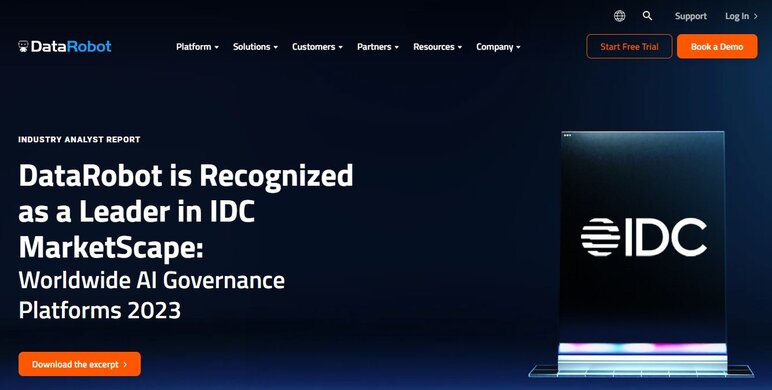
DataRobot excels in automating the AI lifecycle, offering tools like Paxata Data Preparation, Automated Machine Learning, and MLOps. Its versatility allows deployment on-premises, in the cloud, or as a managed service, catering to diverse IT and business needs.
2. KNIME
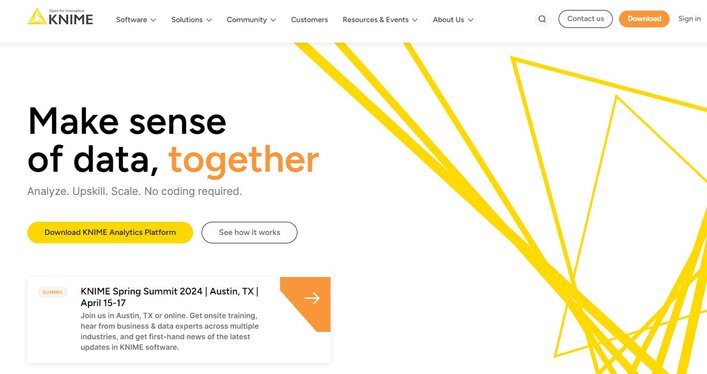
KNIME stands out for its no-code, drag-and-drop interface that simplifies the creation of data science workflows. With over 2000 nodes, it accommodates a wide range of data sources and analytical techniques, fostering innovation and efficiency.
3. Julius AI
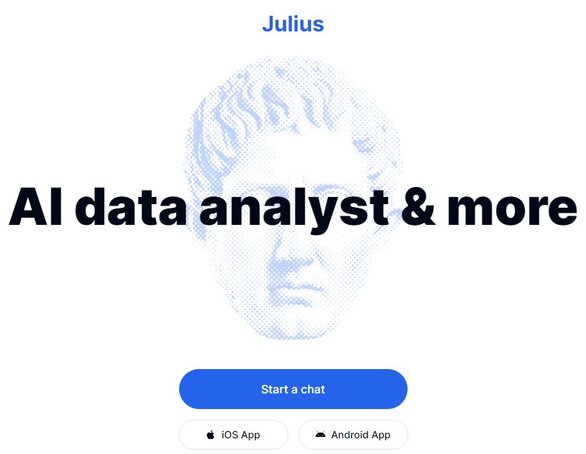
Platform: Julius AI
Julius AI distinguishes itself as a dynamic, user-friendly AI analysis platform designed to empower users with no prior coding experience to perform complex data analysis and visualization. It stands out for its unique ability to integrate seamlessly with various data sources, offering tools for real-time data manipulation, analysis, and visualization. Julius AI is built to simplify the data science process, making it accessible to a broader audience while still offering the depth required by experienced data scientists. With features like natural language processing for intuitive data queries, automated report generation, and custom AI model development, Julius AI is paving the way for a new era of data science tools that are not only powerful but also inclusive and adaptable to various business needs.
4. H2O.ai

H2O.ai is renowned for its open-source, scalable machine learning platform. It supports numerous algorithms and offers AutoML features, simplifying the model selection process with a comprehensive leaderboard of top-performing models
5. Microsoft Azure Machine Learning
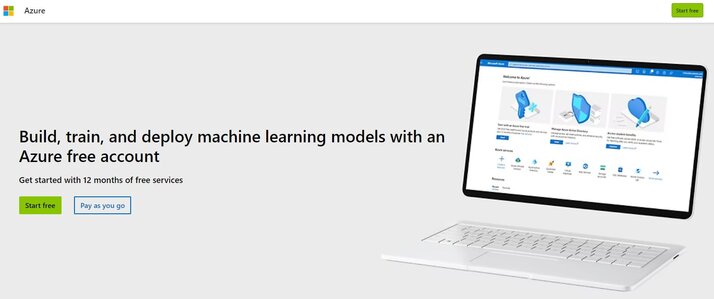
Platform: Azure Machine Learning
Microsoft Azure Machine Learning service enables efficient building, training, and deployment of machine learning models for developers and data scientists. With features catering to all skill levels, including a code-first and drag-and-drop designer alongside automated ML, it facilitates integration with DevOps processes through MLops capabilities. The service prioritizes responsible machine learning with tools for model interpretability, fairness, and data privacy. It supports open-source frameworks and languages like MLflow, Kubeflow, ONNX, PyTorch, TensorFlow, Python, and R, making it a versatile choice for data science projects.
6. Tableau Software
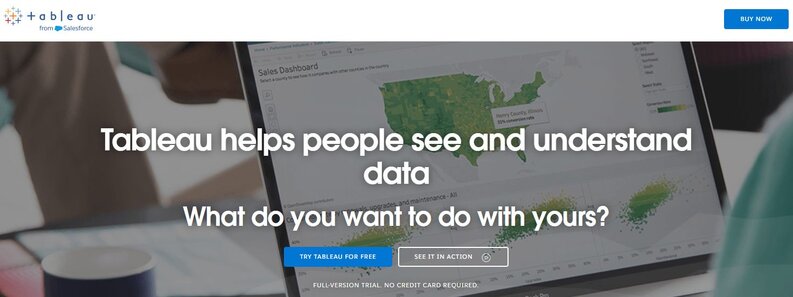
Tableau is a leader in visual analytics, offering a suite of tools that connect to numerous data sources. It supports on-premises and cloud deployments, making data visualization accessible to a broad audience.
7. RapidMiner
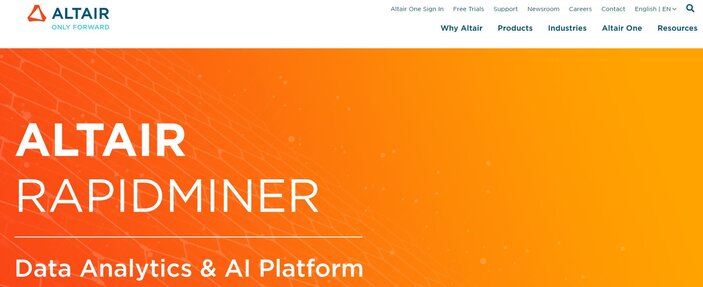
RapidMiner democratizes AI, offering a platform that caters to all skill levels. It covers the entire AI lifecycle, from data preparation to model operations, via a user-friendly interface. It enables anyone to connect to enterprise data, transform it, automate it, construct machine learning models, and deploy those models in production, then build data analytics applications for daily business operations.
8. Sisense
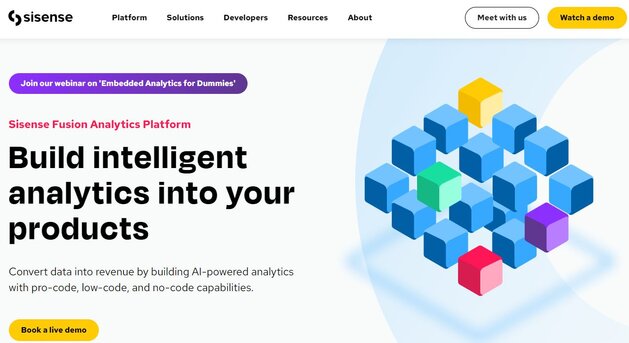
Sisense simplifies complex data analysis, allowing users to glean insights without the need for IT assistance. It’s a complete solution for organizations aiming to analyze large datasets from various sources.
9. SAP
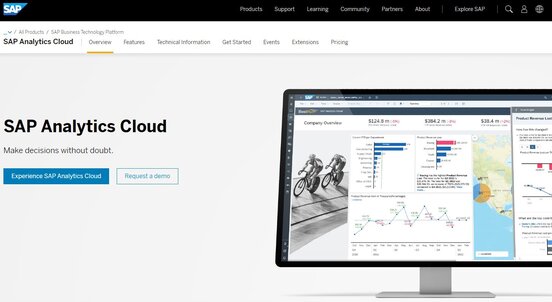
Platform: SAP Analytics Cloud
SAP delivers a comprehensive suite of BI and analytics tools, offering both cloud and on-premises solutions. Its portfolio includes traditional BI capabilities as well as modern, self-service visualization tools.
10. Qlik
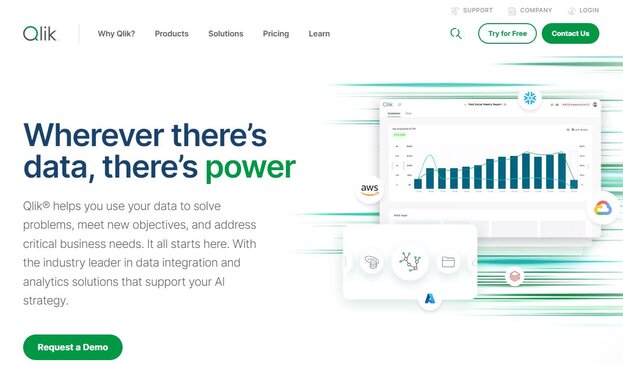
Qlik’s flagship, Qlik Sense, provides a unified view of disparate data sources, promoting data literacy across organizations. Its platform facilitates the development of visual analytics, ensuring governance and security.
Conclusion: The Path Forward with AI Data Science Tools
The landscape of AI data science tools is rich and varied, catering to different needs and objectives. Whether it’s automating the data science workflow, simplifying statistical analysis, or uncovering deep insights through sophisticated algorithms, the right tool can significantly impact an organization's data strategy. By leveraging the strengths of these platforms, businesses can navigate the complexities of data science, harnessing the power of AI to unlock new opportunities and drive innovation. As the field evolves, staying informed and choosing adaptable, robust tools will be key to maintaining a competitive edge in the data-driven future.
Frequently Asked Questions (FAQs)
Will AI replace data science?
AI is unlikely to replace data science entirely; rather, it enhances and transforms how data scientists work. By automating repetitive tasks like data cleaning and model building, AI allows data scientists to focus on more strategic activities like interpreting results and designing experiments. AI complements, rather than replaces, the expertise of data scientists.
How is AI used in data science?
AI is integral to data science, automating processes such as data preprocessing, predictive modeling, and anomaly detection. It enables advanced analytics, such as natural language processing, image recognition, and deep learning, helping data scientists uncover insights more efficiently and accurately.
Which skill is best for data science?
The most critical skill for data science is proficiency in statistical analysis and programming, particularly in languages like Python or R. Equally important are problem-solving abilities, knowledge of machine learning algorithms, and data visualization expertise to effectively communicate insights.
Can a data scientist work in AI?
Yes, a data scientist can seamlessly transition into AI since both fields overlap significantly. Data scientists already possess key skills in machine learning, statistics, and programming, which are foundational for AI development, enabling them to work on AI projects such as building predictive models or designing intelligent systems.
